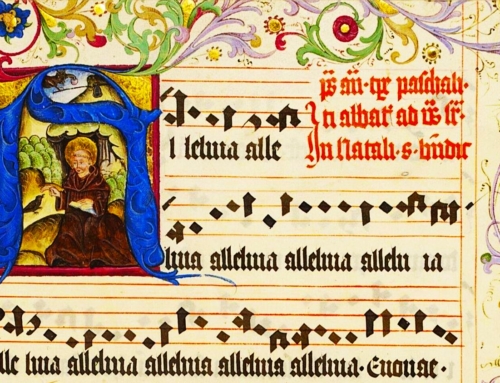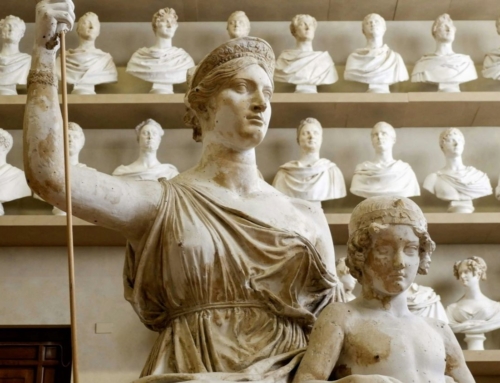On the evening of Thursday, April 22, 2010, I was standing with my novice brothers outside St. Gertrude Priory in Cincinnati, Ohio, waiting to leave for a pro-life dinner downtown. I happened to be holding one of our cell phones, and, shortly before we got into the vans, I received a call I will never forget.
As the phone began to ring, my sister’s cell phone number appeared on the screen: she was calling to tell me that our father, who had no medical conditions that we knew of, had collapsed earlier that day at work. She sounded scared. Thinking the cause of the collapse might have been something relatively minor, I tried to console her and asked her to call me back when she knew more.
When we arrived at the hotel where the dinner was being held, I called my mother from the lobby. She, along with my aunt and uncle, was on the way to the hospital to which my father had been flown. She had no additional news and said that she would call me back when she reached the hospital. I went into the banquet hall for a short time but walked out upon receiving another call from my mother. This time she knew: Dad had died.
It was exactly two weeks before his sixtieth birthday. I was shocked. I went into a secluded area behind a cart full of tables, and there I prayed over the phone with my mom and my aunt and uncle. Then I called my sister and another aunt who was with her and did the same. A few of my novice brothers took me back to the priory, where, still in shock and not knowing how to react, I searched for plane tickets to Minnesota.
At nine o’clock that night, the brothers and I went to the chapel for Compline. The other brothers were not back from the pro-life event yet, but a layman who regularly attended Compline was there with us, so we decided to begin. Afterwards, we remained in the chapel for a few minutes of silent prayer, at which point the other brothers returned, and we prayed Compline again.
It is the only office I have ever sung twice in a row, and, because of the circumstances, Psalm 16 (the assigned psalm on Thursday nights) has acquired a deeper meaning for me. I had heard it many times before, of course, but that night, on which by God’s providence I prayed it twice, its effect was especially consoling and profound. It begins,
Preserve me, God, I take refuge in you.
I say to the Lord: “You are my God.
My happiness lies in you alone.” (Ps 16:1)
Christianity offers consolation to those who mourn, not because it is some “cleverly devised myth” (2 Pt 1:16) designed to make life more bearable, but because the Creator of everything revealed himself to us in the God-man Jesus Christ, who is the way to eternal happiness, the way by which we are able to return to God. In him alone, as the psalm says, our happiness lies:
You will show me the path of life,
the fullness of joy in your presence,
at your right hand happiness for ever. (Ps 16:11)
Through the redemption Christ won for us, we can be confident that, beyond the joys and sufferings of this life, ultimate happiness is attainable—both for ourselves and our departed loved ones.
The psalmist does mention another possibility, however: “Those who choose other gods increase their sorrows” (Ps 16:3). If our happiness does not lie in God, our sorrows will increase. In the end, God gives us what we want: if we do not want him, our separation from him will be eternal. The thought of this possibility, either for ourselves or for our loved ones, scares us. And it should scare us, because part of our love for others is our hope that they will be eternally happy with God.
God is merciful, though, and in his great mercy he allows those who are not yet ready to see him face to face—and this presumably includes all but the most holy among us—to be purified in Purgatory. And so we pray for the souls of the faithful departed. I pray for my father’s soul, that, if he is not already in heaven, he be hastened there, to his eternal home. In this way, God allows us both to experience the reality of a continued relationship with our deceased loved ones and, within that relationship, to exercise charity toward them through our prayers.
Throughout the experience of mourning for departed loved ones and hoping for their eternal salvation, we must always trust in the goodness of God’s providence and keep our eyes fixed on him, at whose right hand is our happiness for ever:
And so my heart rejoices, my soul is glad;
even my body shall rest in safety.
For you will not leave my soul among the dead,
nor let your beloved know decay. (Ps 16:9–10)
Eternal rest grant unto them, O Lord, and let perpetual light shine upon them. May their souls and the souls of all the faithful departed, through the mercy of God, rest in peace. Amen.
✠
Image: Sandro Botticelli, Lamentation Over Christ (Detail: Mary Magdalene)







